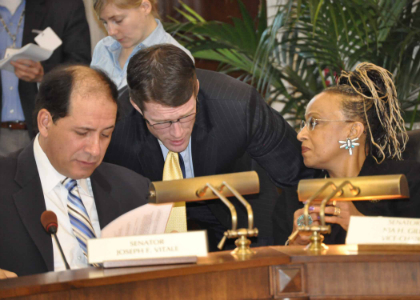
Would Provide New Jerseyans Access to Affordable Quality Health Coverage, Accomplish Key Requirement of Federal Health Care Reform
TRENTON – Legislation sponsored by Senators Nia H. Gill and Joseph F. Vitale to accomplish a key requirement of the federal health care reform law by creating a state health insurance exchange, a competitive marketplace where individuals, families and employers will be able to purchase affordable, quality health care coverage, was approved today by the both houses of the Legislature.
Required under the federal Patient Protection and Affordable Care Act, the health insurance exchange is the first major step toward implementing federal health care reform in New Jersey. The “New Jersey Health Benefit Exchange Act” (S-1319) would serve as a one-stop shop for individuals, families and employers seeking coverage, providing easy-to-understand information about health insurance options which would allow consumers to compare coverage, cost and value of participating plans. It also would provide a streamlined process for individuals and businesses to apply for private insurance, Medicaid, NJ FamilyCare, federal tax credits or other subsidies to be used towards the cost of insurance, through the use of a single website.
“With 1.3 million people uninsured, New Jersey is facing a health care crisis. The health insurance exchange is intended to capture these individuals by creating more affordable health plans through competition and providing clear information to consumers about the coverage available,” said Senator Gill (D-Essex), chair of the Senate Commerce Committee. “The exchange will also allow residents and businesses, through a central virtual marketplace, to purchase health care coverage and to apply for additional financial assistance offered by the government to make insurance more affordable. This system will allow all New Jerseyans to obtain the most appropriate health care coverage at the most competitive rates.”
“The exchange is an essential part of the federal health reform act that is aimed at ensuring that all residents have access to affordable, quality health coverage,” said Senator Vitale (D-Middlesex), chairman of the Senate Health, Human Services and Senior Citizens Committee. “With this legislation, we will create a simple, user-friendly process for obtaining insurance so that people are informed about their options and given seamless access to the type of coverage they need to keep themselves and their families healthy.”
To be established “in but not of” the Department of Banking and Insurance, the exchange would be governed by an independent eight-member board that is free of business ties to interested stakeholders. The governing board will include as non-voting ex-officio members the commissioners of the Department of Banking and Insurance and Human Services, or their designees, and the chairperson of a 15-member Advisory Committee made up of stakeholders who will provide advice to the board. The final five members of the governing board would be residents of the state appointed by the governor with advice and consent of the Senate as follows: one person who is a member of the American Academy of Actuaries, two persons recommended by the Assembly Speaker and two persons recommended by the Senate President, each with knowledge and expertise in specific areas. The governing board would appoint and set compensation for an executive director; board members would serve terms of four years.
The governing board of the exchange would:
• Certify health care plans offered by the Exchange and facilitate the purchase of plans by individuals.
• Establish the State Business Health Options Program (SHOP) to assist participating employers in facilitating the enrollment of their employees in qualified plans;
• Create and offer a Basic Health Plan to enable uninsured persons with incomes of between 133 percent and 200 percent of the federal poverty level (for a family of four, incomes between $30,657 and $46,100 a year) to purchase essential health benefits through the provision of federal funds pursuant to the federal act;
• Develop and implement a plan of operation for the exchange, including the procedures and minimum requirements for the selection, certification and recertification of qualified plans;
• Provide a customer service center and an Internet website that provides standardized comparative information on qualified plans, as well as an online calculator that will allow consumers to determine the cost of a plan after any premium tax credits or subsidies ; and
• Apply for any available federal funding.
Should a state fail to implement an exchange, or if a state is determined by the US Secretary of Health and Human Services no later than January 1, 2013 not to be sufficiently far along in implementation and ready to perform all exchange functions on January 1, 2014, the federal government will administer the exchange in that state. To date, New Jersey has received two federal grants totaling $8.7 million to assist in planning and creation of the state exchange.
“The state is facing a January deadline to demonstrate that it is making progress toward implementation. If we fail to adhere to that timeline, we risk the federal government stepping in to operate our system,” said Senator Gill. “A state-operated exchange is the most optimal path forward for New Jersey. A locally-run program will ensure close oversight of the state’s health insurance market and fair competition among carriers, which are the conditions that will provide for low-cost quality coverage for all residents.”
“Creating a health insurance exchange, the centerpiece of federal healthcare reform, is the first step toward ensuring that every single New Jerseyan has access to affordable health care coverage,” said Senator Vitale. “The exchange also begins the process of creating a more stable and robust health care delivery system in New Jersey, improving the quality of coverage and lowering health costs for all consumers.”
The bill would establish the New Jersey Health Benefit Exchange Trust Fund in the Department of Treasury to be the repository for funds collected from carriers and other monies received as grants or otherwise appropriated for the purposes of the Exchange. The Fund could only be used for the purpose of supporting the activities of the Exchange.
The legislation would take effect on the first day of the seventh month following enactment, but would authorize the Commissioners of DOBI and Human Services to take anticipatory administrative action in advance as necessary for its implementation. The Senate approved the bill by a vote of 22-13. The Assembly approved the bill 42-35. It now heads to the desk of the governor.


